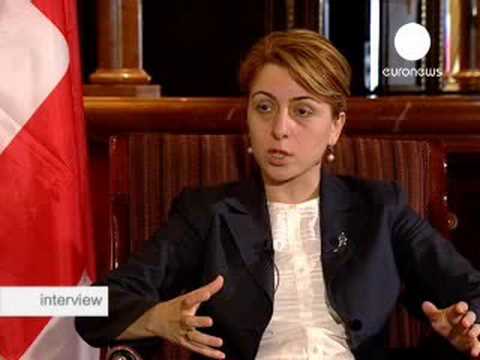Western powers, including the United Nations and NATO are keeping up the pressure on Russia to pull its troops out of Georgia. Germany said the latest delays were unsatisfactory, and the United States said Russia’s withdrawal must be speeded up.
Georgia itself continues to accuse Russia of an organised, well-planned invasion of its territory. Euronews spoke to the Georgian Foreign Minister, Eka Tkeshelashvili.
Denis Loctier, euronews: What’s your view of what has happened in the past two weeks?
Eka Tkeshelashvili: Well, in the past two weeks, an unbelievable chain of events evolved in my country. I would never believe that in the 21st century, in a modern civilized community, in Europe, my country would be militarily invaded by the neighbour country – the Russian Federation. That’s that happened. What we’ve seen – it was already not ad hoc skirmishes from the separatist regimes only, but it was well-planned large scale military operation, with which we’ve been placed in a position either to respond or right away to surrender to the Russian military. Because on the night when the large scale confrontation happened, the [Georgian] villages were extensively shelled, and through the Roki Tunnel from the north already tanks and armoured vehicles were coming in a large scale. So the attack was very harsh, casualties were rising at the time, so the decision was taken to respond to that, basically.
euronews: You’re saying that Russian forces entered Georgian territory before Tskhinvali was attacked by Georgian forces – is that right?
Eka Tkeshelashvili: Yes, it was from the Roki tunnel – it is the North part of the South Ossetia region. It is the main connecting route from Russia to South Ossetia. It was this tunnel with which all the military equipement had been coming, it was already on the 7th of August that the large scale movement started – meaning tanks and armed vehicles coming into the territory of South Ossetia.
euronews: Russia denies that – it says there was no military reaction from its side before a day, or a day and a half, after the start of the bombardment of Tskhinvali.
Eka Tkeshelashvili: Well, there’s very credible information collected not from the Georgian side, but every other state which has intelligence information from aerial pictures – it’s credibly seen that within a day there were already 6,000 Russian soldiers on the territory of South Ossetia.
euronews: Why was Tskhinvali attacked, and not the Roki tunnel, where, as you say, Russian military was entering Georgia?
Eka Tkeshelashvili: Well, first of all the response was to the threat to the Georgian villages, and then the threat was coming from the shelling of Tskhinvali, and it was the military response to that. And other than that – the tactical moves around the Roki tunnel – I know that we were able to damage the bridge from which the equipement what we already knew of had come, out of the Roki tunnel, but then they managed to bypass the bridge and then still enter with heavy equipment.
euronews: Did Georgian forces use multiple rocket launchers and other indiscriminate assault weapons against residential parts of Tskhinvali, as Russia claims?
Eka Tkeshelashvili: Well, the targets that were identified for the military forces on the Georgian side were legitimate targets, which was the artillery weapons from the other side. It was very unfortunate that the artillery from the other side had been placed in some cases in the residential areas, because it’s the responsibility of the party which uses any weapons to install these weapon or an object, a military object, which in itself is a legitimate target for an attack, outside of any locations with which civilians can be impacted. It would have been the same obligation for the Georgian forces not to place its own weapons right in the middle of the residential areas, so that when the opposing party would respond to the artillery or any other firing from the Georgian side they would inevitably hit the civilian targets as well.
euronews: Did that happen? Because Russian military sources say some Georgian artillery was placed in Gori.
Eka Tkeshelashvili: Absolutely incorrect. I was in Gori during the confrontation myself several times, nothing was ever placed in the center of Gori. What we’ve seen from the Russian side was not collateral damage to the civilians that they inflicted, but direct targeting of civilians.
euronews: Russia argues it had to conduct a peace enforcement operation after the assault on Tskhinvali left hundreds or even thousands dead – mostly civilians and mostly Russian citizens. Doesn’t Moscow have a point there?
Eka Tkeshelashvili: If there’s any need for enforcement of peace in any part of the globe, it’s a specific task of the Security Council and the Chapter 7 to decide upon those measures and implement those measures. No state can ever unilaterally take upon itself a role of a peace enforcer. Leaving that aside, in terms of the propaganda that Russia is using in this whole endeavour well, “Human Rights Watch” was already in position to see the situation on the ground, and then collect information, and the statement that we’ve already seen from the HRWis quite clear saying that the information Russian side puts out is not substantiated. There are no evidence to confirm the level of casualties, of the level of damage that the Russian side portrays as the pretext for its military invasion into Georgia, so if Russian side has any evidence – they had better present that.
euronews: Russia says the re-integration of Georgia is now impossible. Apparently Moscow is ready to recognise the independence of the breakaway republics. Do you see any way out of this?
Eka Tkeshelashvili: Well, plans from the Russian side are quite clear: they wanted to initially destabilise Georgia, to provoke confrontation in Georgia and with that to make sure that Georgia can never be an independent state from Russia. That’s their ultimate goal. That’s why the regime change was something that they targeted. And I don’t have any expectation that they will give up that target, so it will be a very tense period in which we’ll have to be united in confronting the aspirations of the Russian Federation.
euronews: Do you have any hope of solving the territorial conflict now?
Eka Tkeshelashvili: Definitely yes. If we can establish a genuinely international format for negotiations and security on the ground – I’m more than confident that we’ll be able, step by step, to establish a process in which the re-integration of these regions will be full scale, for the benefit of all who used to live in those regions, who now live in those regions, and they will be prosperous parts of a prosperous Georgia, if that is the case then.
euronews: Lately we heard new statements predicting Georgia’s future in NATO. Do you feel pressed to solve the territorial conflicts because of this issue?
Eka Tkeshelashvili: Now, after what happened in Georgia, I think it’s again a common understanding that this conflict had to be solved quickly, in a prompt manner, and effectively. Because if not, then they will always remain open platforms for Russia’s manipulations of the situation in those regions, and with that jeopardizing the situation in Georgia, and with that jeopardizing the further integration of Georgia into the community of Western democracies, and they’re trying again to regain influence in other parts of the world.





